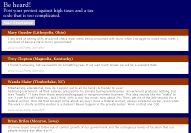Proof Tea Party is astroturf: Koch group tried to start Teaparties in 2002
If you trust their defenders, the Tea Parties were a spontaneously formed grassroots group initiated by Rick Santelli's 2009 rant or a slightly earlier anti-tax rally organized by Keli Carender. Those same defenders will deny that the Koch family has anything to do with the Teaparties.
Here's why you can't trust their defenders: back in 2002, a group linked to the Koch family tried to start a Teaparties movement that's the mirror image of today's Teaparty movement.
The 2002 effort was called the "U.S. Tea Party", it wrapped itself in the flag, patriotism, and the Revolutionary War like the current Teapartiers do, and it warned about the "American tax burden" supposedly being "larger than ever" and the tax code "grow[ing] ever more complex".
In other words, the Teaparties of 2009 and onwards is just a more successful version of a nearly identical movement a group linked to the Koch brothers (and Big Tobacco) tried to start way back in 2002.
So much for a spontaneous grassroots movement.
An archived copy of the website usteaparty.com as of 2002 can be seen here; screengrabs are below. Compare that 2002 website to any Teaparty website of today.
An academic study concerning tobacco companies' interest in starting astroturf movements to push their agenda is described here, with the abstract here.
The group behind usteaparty.com is listed as Citizens for a Sound Economy ("CSE"). CSE was founded by the Koch brothers and funded by major corporations. CSE disbanded, splitting into two groups: FreedomWorks and Americans for Prosperity. Two Freedomworks leaders - Dick Armey and Matt Kibbe - served on the CSE board in 2004 before the split. The domain now has a holding page, but Freedomworks still owns it.
In case anyone tries to claim that the Teaparties were just a spontaneous movement that started in 2009, ask them to explain the 2002 website that has all the features of a 2013 Teaparty website and the involvement of the same people in both groups.
Screenshots of the 2002 website follow; click each link for the full image.







